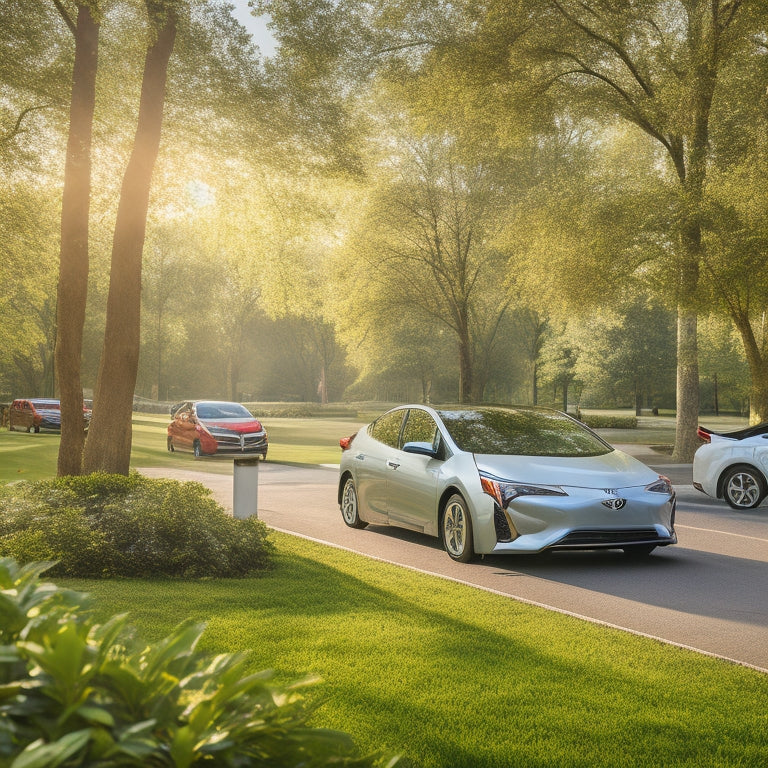
What's the Best Eco-Friendly Commuter Car for You?
Share
You're likely to reduce your carbon footprint and save money on fuel costs by opting for an eco-friendly commuter car, with electric vehicles, hybrids, and fuel-efficient gas-powered cars emerging as top contenders for environmentally conscious urban commuters. Consider the Toyota Prius, Honda Civic Hybrid, or used electric vehicles like the Nissan Leaf and Fiat 500e for cost-effective options. If you're covering long distances, innovative electric vehicles with rapid recharge times and advanced route planning can alleviate range anxiety. As you explore the best eco-friendly commuter car for you, you'll uncover more about the latest innovations and incentives that can fuel your sustainable commute.
Key Takeaways
• Consider your daily commute distance and choose an eco-friendly car with a suitable electric range or fuel efficiency.
• Evaluate your budget and explore cost-effective options like hybrid vehicles, used electric cars, or fuel-efficient gas-powered cars.
• Research top electric vehicle brands like Tesla, Hyundai/Kia, and Nissan, considering factors like EV history, brand loyalty, and overall value.
• Assess your specific needs, such as space requirements for large families, and explore eco-friendly cars that cater to your needs.
• Look for features like fast charging, long-distance capabilities, and cost-effective travel to ensure the best eco-friendly commuter car for your lifestyle.
Electric Cars for City Driving
When driving through congested city streets, you'll find that electric cars are an ideal choice for commuting, offering a zero-emission, cost-effective, and quiet alternative to traditional gas-guzzlers. As a city dweller, you're likely familiar with the frustrations of maneuvering urban landscapes, where traffic congestion and air pollution are a constant concern.
Electric cars provide a welcome respite from these issues, producing zero tailpipe emissions and reducing your carbon footprint. Their quiet operation also makes them a pleasant choice for city driving, where noise pollution can be a significant problem.
Electric cars require less maintenance than their gas-powered counterparts, with fewer moving parts and no oil changes needed. This makes them an attractive option for city dwellers who want a reliable and hassle-free commute. With their many benefits, it's no wonder electric cars are becoming an increasingly popular choice for urban commuters.
Cost-Effective Eco-Friendly Options
As you weigh the benefits of electric cars for city driving, you'll likely want to explore cost-effective eco-friendly options that fit your budget and lifestyle. Green budgeting is essential when contemplating an eco-friendly commuter car. You want to make sure that your environmentally friendly choice doesn't break the bank.
Here are three cost-effective eco-friendly options to explore:
-
Hybrid vehicles: Offering impressive fuel efficiency, hybrids like the Toyota Prius or Honda Civic Hybrid are great options for city driving.
-
Used electric vehicles: A pre-owned EV like the Nissan Leaf or Fiat 500e can provide significant savings while still offering an eco-friendly driving experience.
-
Fuel-efficient gas-powered cars: Models like the Honda Fit or Chevrolet Cruze offer excellent fuel efficiency without the higher upfront cost of an EV or hybrid.
When examining these options, take into account factors like fuel efficiency, maintenance costs, and incentives like tax credits or rebates.
Long-Distance EV Commuting
As you consider long-distance EV commuting, you'll want to tackle the common concern of range anxiety.
Fortunately, innovative solutions are emerging to alleviate this issue, such as advanced route planning and real-time charging station locators.
Range Anxiety Solutions
You'll face fewer range anxiety issues with a well-planned route, taking advantage of the growing network of high-power charging stations that can refill your battery to 80% in under 30 minutes. This, combined with public education on EV capabilities, can greatly reduce range anxiety. As charging infrastructure continues to expand, long-distance EV commuting becomes increasingly viable.
Here are some key factors to take into account when planning your route:
-
Charging Station Density: Look for areas with high concentrations of charging stations, making it easier to find a charging point when you need it.
-
Route Optimization: Use online tools or apps to optimize your route, minimizing detours and reducing the need for frequent charging stops.
-
Real-Time Traffic Updates: Stay informed about traffic conditions, allowing you to adjust your route and charging schedule accordingly.
Highway Charging Networks
Highway charging networks, comprising strategically located stations along highways, have become essential infrastructure for long-distance EV commuting, allowing drivers to recharge quickly and confidently along their routes.
As you plan your EV commute, you'll want to familiarize yourself with the highway charging networks along your route. These networks are vital for extending your driving range, alleviating range anxiety, and making long-distance EV travel a breeze.
When driving through rural areas, you'll appreciate the Rural Access initiatives that bring charging stations to these often-overlooked regions. This increased accessibility guarantees you can explore the countryside without worrying about running out of juice.
In contrast, Urban Hubs are equipped with high-power charging stations, perfect for quick top-ups during your daily commute. You'll find these hubs strategically located near shopping centers, restaurants, and other high-traffic areas, making it easy to recharge while running errands or grabbing a bite to eat.
As you navigate the highway, you'll rely on these charging networks to keep your EV going. By understanding the layout and capabilities of these networks, you'll be better equipped to plan your route, minimize downtime, and enjoy a stress-free EV commuting experience.
Top Electric Vehicle Brands
Leading the charge towards a sustainable future, several top electric vehicle brands are revolutionizing the commuter car market with their innovative designs and cutting-edge technology. As you consider making the switch to an eco-friendly commuter car, it's essential to explore the top electric vehicle brands that are paving the way.
Here are three brands that stand out from the rest:
-
Tesla: A pioneer in the EV industry, Tesla has been at the forefront of electric vehicle technology for over two decades. With a wide range of models, including the popular Model 3 and Model S, Tesla has built a loyal following among EV enthusiasts.
-
Hyundai/Kia: Hyundai and Kia have made significant strides in the EV market, offering affordable and feature-packed models like the Hyundai Kona Electric and Kia Niro EV. Their commitment to EV development has garnered a loyal customer base.
-
Nissan: As one of the earliest adopters of EV technology, Nissan has a rich EV history, with the Leaf being one of the best-selling EVs of all time. Their dedication to innovation and sustainability has earned them a loyal customer following.
When choosing an EV brand, consider factors like EV history, brand loyalty, and overall value. By doing so, you'll find the perfect eco-friendly commuter car that meets your needs and contributes to a sustainable future.
Best Small Electric Cars
As you explore the top electric vehicle brands, it's likely you're also considering the ideal car size for your daily commute, which is where small electric cars come into play, offering a perfect blend of efficiency, affordability, and eco-friendliness.
These compact vehicles are tailor-made for urban mobility, catering to city dwellers who need a reliable and sustainable mode of transportation. With their compact dimensions, small electric cars can navigate through congested city streets with ease, making them an excellent choice for daily commutes.
When it comes to range anxiety, small electric cars have made significant strides, with many models offering an impressive range of over 150 miles on a single charge. Additionally, their smaller size and lighter weight reduce energy consumption, allowing you to travel farther on a single charge.
With their affordability, eco-friendliness, and impressive range, small electric cars are an attractive option for urban commuters. As you weigh your options, consider the benefits of small electric cars, which are poised to revolutionize urban mobility and make city living more sustainable.
Green Cars for Large Families
While your family's size may have previously limited your eco-friendly car options, you'll find that many modern green cars are now designed with large families in mind, offering ample space and innovative features to accommodate your crew. You no longer have to sacrifice eco-friendliness for space and comfort.
Here are some eco-friendly Family Haulers that offer ample space for your family:
-
Toyota Highlander Hybrid: With its spacious interior and hybrid powertrain, this SUV is perfect for large families who want to reduce their carbon footprint.
-
Honda Pilot Hybrid: This hybrid SUV offers ample cargo space and seating for up to eight passengers, making it an ideal choice for large families.
-
Kia Sorento Hybrid: This hybrid SUV boasts a spacious interior, comfortable seating, and excellent fuel efficiency, making it an excellent option for eco-conscious families.
These Space Savers are designed to provide ample room for your family while minimizing your environmental impact. Whether you're driving to school, soccer practice, or on a family road trip, these eco-friendly Family Haulers have got you covered.
Fast Charging Electric Vehicles
As you explore the world of eco-friendly commuter cars, you'll find that fast charging electric vehicles offer a game-changing solution for daily commutes.
With rapid recharge times, you'll be back on the road in no time, and with long-distance capabilities, you'll never have to worry about running out of juice.
Plus, cost-effective travel means you'll be saving money on fuel costs, making these vehicles an attractive option for environmentally conscious commuters.
Rapid Recharge Times
You'll be back on the road in no time with rapid recharge times, which can refill your battery to 80% in under 30 minutes, making electric vehicles a viable option for daily commutes. With rapid power, you can quickly top up your battery, ensuring you're always on the move.
Here are three benefits of rapid recharge times:
-
Reduced downtime: Spend less time waiting and more time driving with rapid recharge times that get you back on the road quickly.
-
Increased flexibility: With the ability to quickly top up your battery, you can take detours or make unexpected stops without worrying about running out of juice.
-
Enhanced convenience: Rapid recharge times make owning an electric vehicle more practical, allowing you to fit charging into your busy schedule.
Rapid recharge times are a game-changer for commuters, providing the convenience and flexibility you need to get where you're going. With the ability to quickly refill your battery, you can focus on the road ahead, not the charging station.
Long-Distance Capabilities
Take your eco-friendly commuter car on extended road trips with fast charging electric vehicles, which can cover long distances without sacrificing performance or range anxiety. You'll be surprised at how easily you can commence on cross-country adventures, stopping only to recharge at one of the many fast-charging stations along the way.
With the ability to add up to 100 miles of range in just 30 minutes, you can drive from coast to coast without worrying about running out of juice.
When planning your next road trip, consider an electric vehicle with a range of at least 250 miles. This will give you the flexibility to drive for hours without needing to recharge, making long-distance travel a breeze.
Plus, with the growing network of fast-charging stations, you'll have plenty of opportunities to top off along the way. Whether you're heading to the beach, the mountains, or visiting family across the country, an electric vehicle with fast charging capabilities is the perfect companion for your next adventure.
Cost-Effective Travel
With fast charging electric vehicles, you can save up to 70% on fuel costs compared to traditional gas-powered cars, making long-distance travel a cost-effective option. This is especially true when you take advantage of fuel cards and travel rewards programs that offer discounts and cashback on fuel purchases.
Here are three ways fast charging electric vehicles can help you travel cost-effectively:
-
Lower fuel costs: Electric vehicles can save you up to 70% on fuel costs compared to traditional gas-powered cars.
-
Fuel card benefits: Many fuel cards offer discounts and cashback on fuel purchases, which can add up to significant savings over time.
-
Travel rewards: Some electric vehicles come with travel rewards programs that offer discounts on accommodations, food, and other travel-related expenses.
Government Incentives for EVs
Governments around the world often offer enticing incentives to encourage the adoption of electric vehicles, greatly reducing the upfront cost of going green. As you consider making the switch to an eco-friendly commuter car, you'll want to explore the government incentives available to you.
In the United States, for example, you may be eligible for a federal Tax Credit of up to $7,500 when you purchase a qualifying electric vehicle. Additionally, many states offer their own incentives, such as State Rebates, which can further lower the cost of owning an EV. For instance, California offers a rebate of up to $5,000 for the purchase of a new EV.
These incentives can significantly decrease the cost of owning an electric vehicle, making it a more affordable option for you. Be sure to research the specific incentives available in your area to maximize your savings. By taking advantage of these government incentives, you can drive away in a new eco-friendly commuter car for a price that's more within your reach.
Frequently Asked Questions
Can I Charge My Electric Car at a Gas Station?
You can't charge your electric car at a gas station, but you can use public chargers or roadside assistance services that offer charging solutions, making it convenient to refuel on the go.
Are Electric Vehicles More Expensive to Insure?
You'll find that insurance costs for electric vehicles (EVs) vary, but generally, they're comparable to gas-powered cars. Premium disparities exist, though, with some insurers offering lower rates for EVs, while others charge more due to higher repair costs.
Do Electric Cars Have Less Maintenance Than Gas Cars?
As you hit the open road, your electric car hums like a gentle stream, and you'll be relieved to know that, yes, electric cars generally require less maintenance than gas cars, with fewer moving parts and longer battery life, making road trips a breeze.
Can I Install an EV Charger in My Apartment?
You'll need to check your apartment's regulations before installing an EV charger, ensuring your home's wiring can handle the increased power demand, and possibly obtaining permission from your landlord or building management.
Are Electric Vehicles Safe in Extreme Weather Conditions?
You're probably wondering if electric vehicles can handle extreme weather. Rest assured, most EVs are designed with climate resistance in mind, ensuring battery performance remains stable in freezing cold or scorching hot temperatures.
Related Posts
-

What's the Best Green Ride for College Budgets?
As a college student on a budget, you're likely looking for an eco-friendly ride that won't break the bank. You've go...
-

Why Are Online Prices for Panels So Low?
When you buy panels online, you're often taking advantage of a combination of factors that drive prices lower. You're...
-

7 Best Financial Incentives for Residential Homeowners
You're entitled to a range of financial incentives that can help offset the costs of owning a home, from federal tax ...


